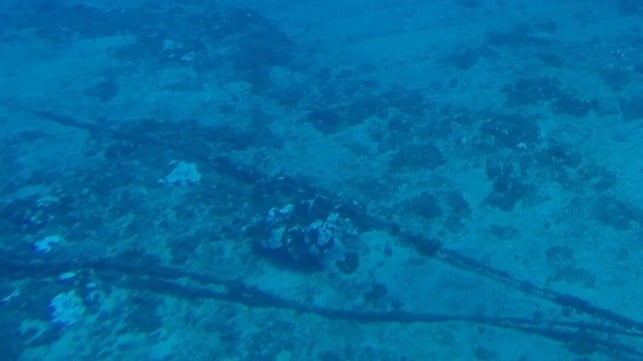After Subsea Cable Damage, Five Nations Warn of Russian Hybrid Warfare

On Tuesday, just days after two Baltic subsea cables were severed in a suspected intentional attack, five European countries issued a condemnation of Russian espionage activities within the EU. The message addressed a broad, ongoing campaign of Russian sabotage operations against Ukraine's allies.
"Russia is systematically attacking European security architecture. Moscow’s escalating hybrid activities against NATO and EU countries are also unprecedented in their variety and scale, creating significant security risks," the foreign ministers of France, Germany, Italy, Poland, and Britain said in a statement after a meeting in Warsaw. "We are determined to stand united with our European and transatlantic partners to think and act big on European security."
The two subsea cables were cut last weekend in back-to-back incidents. On Sunday morning at 0800, a subsea fiber connection between Lithuania and the strategic island of Gotland, Sweden went out of service due to physical damage. Overnight, the C-Lion1 cable between Finland and Germany was also severed. According to Finland's state telecom company, Cinia, the line may have been cut by an "outside force."
Carl-Oskar Bohlin, Sweden's civil defense minister, said Tuesday that there were notable ship movements in the vicinity of the cable damage sites at the time of the outages. Without identifying the vessels, he said that "we of course take this very seriously against the background of the serious security situation."
Open source intelligence analysts have identified a possible suspect vessel, the bulker Yi Peng 3, which displayed unusual course and speed changes while on an outbound voyage from St. Petersburg at the time of the outages. The ship was intercepted by the Danish Navy, and as of Tuesday it was anchored in the Kattegat.
European security officials suspect that the cable breaks were acts of sabotage, and though they have not identified a culprit, Russia ranks high on the list: it has a strong motive due to European support for Ukraine, a recent history of covert attacks on EU targets, and well-developed technical capabilities for seabed warfare.
"No one believes that these cables were accidentally damaged. And I don't want to believe in the versions that anchors are to blame," said German Defense Minister Boris Pistorius on Tuesday. "So we have to conclude, without knowing who did that, that this is a hybrid action. And we also have to assume, without knowing, of course, that this is sabotage."
Dutch Defense Minister Ruben Brekelmans edged closer to naming Russia as a primary suspect. "We see increasing activity of especially Russia on our seas, aimed at espionage and possibly even sabotage of our vital infrastructure," he noted in comments to the Dutch press on Tuesday.

that matters most
Get the latest maritime news delivered to your inbox daily.
The last major subsea infrastructure incident in the Baltic occurred in October 2023, and it was attributed to a Chinese container ship, the NewNew Polar Bear. As the vessel transited across the northeastern Baltic Sea towards St. Petersburg, it trailed an anchor along the bottom for hundreds of nautical miles, rupturing the Balticconnector gas pipeline and severing two fiber-optic cables.
A far larger attack on the Nord Stream pipeline system in 2022 has not been formally solved, but multiple investigations point towards Ukrainian actors, potentially with government backing.
